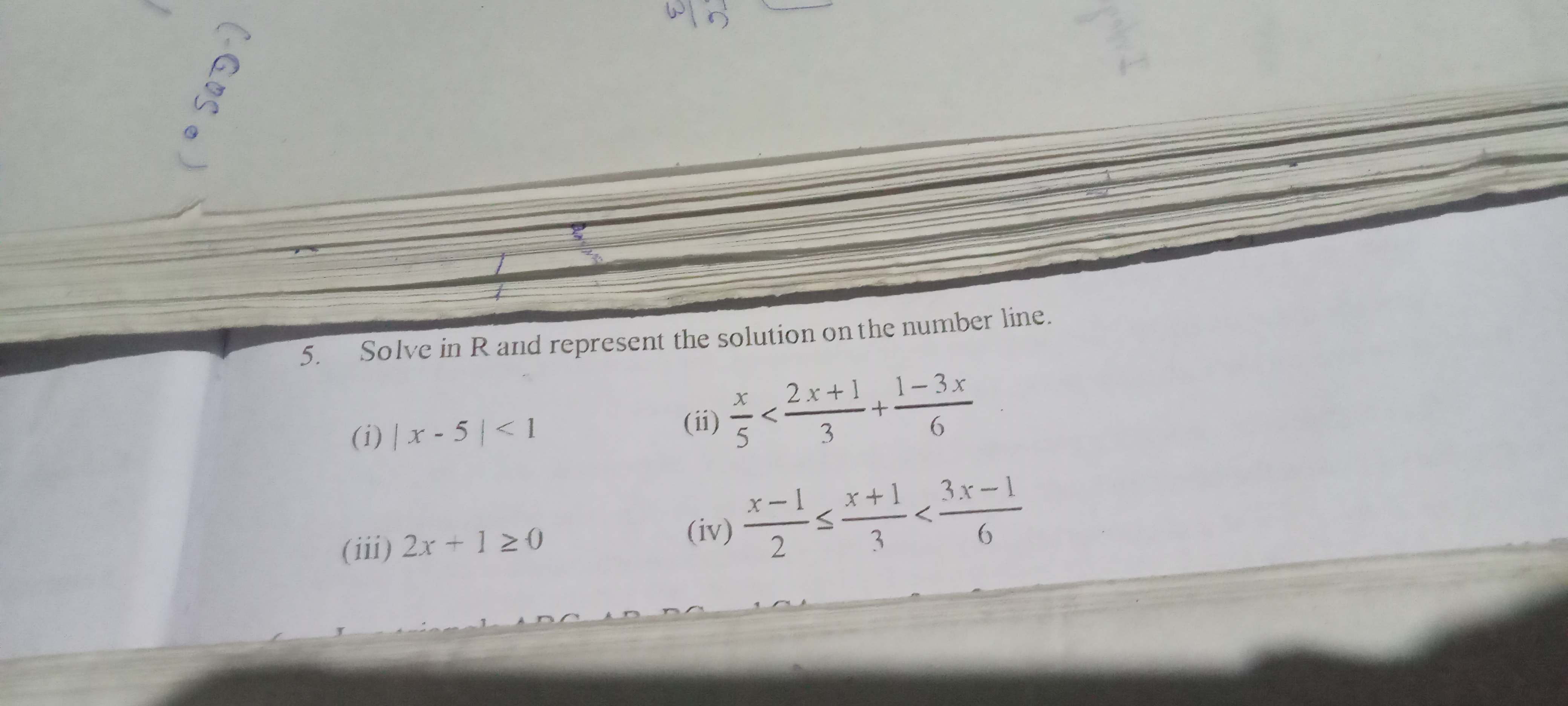Solve in R and represent the solution on the number line. (i) |x - 5| < 1 (ii) x/5 < (2x + 1)/3 + (1 - 3x)/6 (iii) 2x + 1 ≥ 0 (iv) (x - 1)/2 ≤ x + 1/3 < (3x - 1)/6

Understand the Problem
The question asks to solve a series of inequalities in the real number system (R) and to represent their solutions on a number line. It includes absolute values and rational expressions.
Answer
The solution intervals are: 1. $-\frac{5}{3} \leq x < -1$ 2. $-1 < x < \frac{3
Answer for screen readers
The solutions are as follows:
- $4 < x < 6$
- $x < \frac{3}{5}$
- $x \geq -\frac{1}{2}$
- $-\frac{5}{3} \leq x < -1$
On combining, the overall intervals are:
- $-\frac{5}{3} \leq x < -1$
- $-1 < x < \frac{3}{5}$
- $4 < x < 6$
Steps to Solve
- Solve Inequality (i): |x - 5| < 1
To solve the inequality $|x - 5| < 1$, we break it into two parts: $$ -1 < x - 5 < 1 $$
Adding 5 to all parts gives: $$ 4 < x < 6 $$
- Solve Inequality (ii): $x/5 < (2x + 1)/3 + (1 - 3x)/6$
First, find a common denominator. The common denominator for the fractions is 6. Rewrite the left side: $$ \frac{6x}{30} < \frac{(2x + 1) \cdot 2}{6} + \frac{(1 - 3x)}{6} $$
Now combine the right side: $$ 6x < 4x + 2 + 1 - 3x $$
Simplifying gives: $$ 6x < x + 3 $$
Subtract $x$ from both sides: $$ 5x < 3 $$
Dividing by 5: $$ x < \frac{3}{5} $$
- Solve Inequality (iii): $2x + 1 \geq 0$
To solve, subtract 1 from both sides: $$ 2x \geq -1 $$
Dividing both sides by 2 gives: $$ x \geq -\frac{1}{2} $$
- Solve Inequality (iv): $\frac{x - 1}{2} \leq x + \frac{1}{3} < \frac{3x - 1}{6}$
- For the left part, $\frac{x - 1}{2} \leq x + \frac{1}{3}$:
Multiply everything by 6 (to eliminate the fractions): $$ 3(x - 1) \leq 6(x + \frac{1}{3}) $$
This simplifies to: $$ 3x - 3 \leq 6x + 2 $$
Rearranging gives: $$ -3 \leq 3x + 2 $$
Subtracting 2 from both sides: $$ -5 \leq 3x $$
Dividing by 3: $$ -\frac{5}{3} \leq x $$
- Now for the right part: $x + \frac{1}{3} < \frac{3x - 1}{6}$:
Multiply by 6 again: $$ 6(x + \frac{1}{3}) < 3x - 1 $$
This simplifies to: $$ 6x + 2 < 3x - 1 $$
Rearranging gives: $$ 6x - 3x < -1 - 2 $$
Thus: $$ 3x < -3 $$
Dividing by 3: $$ x < -1 $$
Combining the results for (iv): $$ -\frac{5}{3} \leq x < -1 $$
- Summarizing All Inequalities
The solutions are:
- (i) $4 < x < 6$
- (ii) $x < \frac{3}{5}$
- (iii) $x \geq -\frac{1}{2}$
- (iv) $-\frac{5}{3} \leq x < -1$
The solutions are as follows:
- $4 < x < 6$
- $x < \frac{3}{5}$
- $x \geq -\frac{1}{2}$
- $-\frac{5}{3} \leq x < -1$
On combining, the overall intervals are:
- $-\frac{5}{3} \leq x < -1$
- $-1 < x < \frac{3}{5}$
- $4 < x < 6$
More Information
This problem involves solving inequalities involving absolute values and rational expressions, a common topic in algebra. The representation on the number line highlights the intervals where the solutions are valid.
Tips
- Forgetting to reverse the inequality sign when multiplying or dividing by a negative number.
- Incorrectly combining the intervals when solving multiple inequalities together.
- Misinterpreting absolute values; always remember to break them into two inequalities.
AI-generated content may contain errors. Please verify critical information